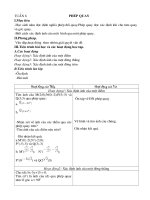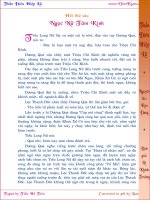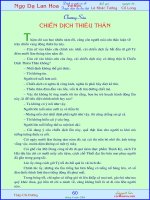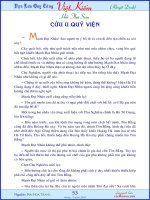Nghĩa từ phức tạp 6 doc
Bạn đang xem bản rút gọn của tài liệu. Xem và tải ngay bản đầy đủ của tài liệu tại đây (54.3 KB, 6 trang )
anxious/eager
ANXIOUS/EAGER
Most people use “anxious” interchangeably with “eager,” but its original meaning had to do with
worrying, being full of anxiety. Perfectly correct phrases like, “anxious to please” obscure the
nervous tension implicit in this word and lead people to say less correct things like “I’m anxious for
Christmas morning to come so I can open my presents.” Traditionalists frown on anxiety-free
anxiousness. Say instead you are eager for or looking forward to a happy event.
List of errors
file:///C|/Temp/livres/commonerrors/errors/anxious.html03/09/2005 15:36:53
anymore
ANYMORE
ANY MORE
In the first place, the traditional (though now uncommon) spelling is as two words: “any more” as in “We do not sell bananas any more.” In the second
place, it should not be used at the beginning of a sentence as a synonym for “nowadays.” In certain dialects of English it is common to utter phrases like
“anymore you have to grow your own if you want really ripe tomatoes,” but this is guaranteed to jolt listeners who aren’t used to it. Even if they can’t
quite figure out what’s wrong, they’ll feel that your speech is vaguely clunky and awkward. “Any more” always needs to be used as part of an expression
of negation except in questions like “Do you have any more bananas?” Now you won’t make that mistake any more, will you?
List of errors
file:///C|/Temp/livres/commonerrors/errors/anymore.html03/09/2005 15:36:53
anytime/any time
ANYTIME
ANY TIME
Though it is often compressed into a single word by analogy with “anywhere” and similar words, “any time” is traditionally a two-word phrase.
List of errors
file:///C|/Temp/livres/commonerrors/errors/anytime.html03/09/2005 15:36:53
anyways
ANYWAYS
ANYWAY
“Anyways” at the beginning of a sentence usually indicates that the speaker has resumed a narrative thread: “Anyways, I told Matilda that guy was a lazy
bum before she ever married him.” It also occurs at the end of phrases and sentences, meaning “in any case“: “He wasn’t all that good-looking
anyways.” A slightly less rustic quality can be imparted to these sentences by substituting the more formal anyway. Neither expression is a good idea in
formal written English. The two-word phrase “any way” has many legitimate uses, however: “Is there any way to prevent the impending disaster?”
List of errors
file:///C|/Temp/livres/commonerrors/errors/anyways.html03/09/2005 15:36:53
apart
APART/A PART
Paradoxically, the one-word form implies separation while the two-word form implies union.
Feuding roommates decide to live apart. Their time together may be a part of their life they will
remember with some bitterness.
List of errors
file:///C|/Temp/livres/commonerrors/errors/apart.html03/09/2005 15:36:54
apostrophes
APOSTROPHES
First let’s all join in a hearty curse of the grammarians who inserted the wretched apostrophe into possessives in the first place. It was all a mistake. Our
ancestors used to write “Johns hat” meaning “the hat of John” without the slightest ambiguity. However, some time in the Renaissance certain scholars
decided that the simple “s” of possession must have been formed out of a contraction of the more “proper” “John his hat.” Since in English we mark
contractions with an apostrophe, they did so, and we were stuck with the stupid “John’s hat.” Their error can be a handy reminder though: if you’re not
sure whether a noun ending in “s” should be followed by an apostrophe, ask yourself whether you could plausibly substitute “his” or “her” for the “s.”
The exception to this pattern is personal pronouns indicating possession like “his,” “hers,” and “its.” For more on this point, see “its/it’s.”
Get this straight once and for all: when the “s” is added to a word simply to make it a plural, no apostrophe is used (except in expressions where letters or
numerals are treated like words, like “mind your P’s and Q’s” and “learn your ABC’s”).
Apostrophes are also used to indicate omitted letters in real contractions: “do not” becomes “don’t.”
Why can’t we all agree to do away with the wretched apostrophe? Because its two uses—contraction and possession—have people so thoroughly
confused that they are always putting in apostrophes where they don’t belong, in simple plurals (“cucumber’s for sale”) and family names when they are
referred to collectively (“the Smith’s” ).
The practice of putting improper apostrophes in family names on signs in front yards is an endless source of confusion. “The Brown’s” is just plain
wrong. (If you wanted to suggest “the residence of the Browns” you would have to write “Browns’,” with the apostrophe after the “S,” which is there to
indicate a plural number, not as an indication of possession.) If you simply want to indicate that a family named Brown lives here, the sign out front
should read simply “The Browns.” When a name ends in an “S” you need to add an “ES” to make it plural: “the Adamses.”
file:///C|/Temp/livres/commonerrors/errors/apostrophes1.html (1 sur 2)03/09/2005 15:36:54









